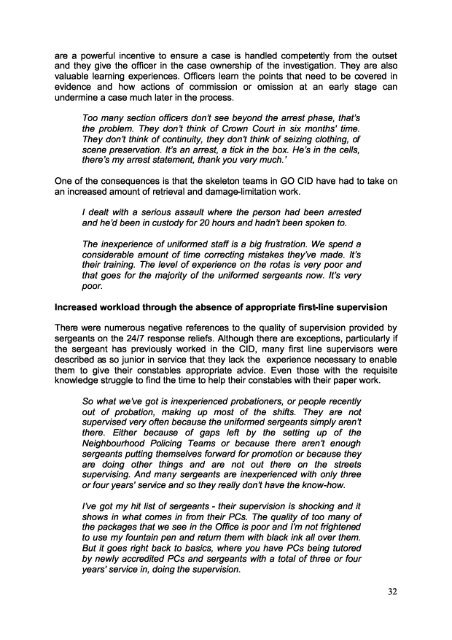LOSING THE DETECTIVES: VIEWS FROM THE ... - Police Federation
LOSING THE DETECTIVES: VIEWS FROM THE ... - Police Federation
LOSING THE DETECTIVES: VIEWS FROM THE ... - Police Federation
You also want an ePaper? Increase the reach of your titles
YUMPU automatically turns print PDFs into web optimized ePapers that Google loves.
are a powerful incentive to ensure a case is handled competently from the outset<br />
and they give the officer in the case ownership of the investigation. They are also<br />
valuable learning experiences. Officers learn the points that need to be covered in<br />
evidence and how actions of commission or omission at an early stage can<br />
undermine a case much later in the process.<br />
Too many section officers don’t see beyond the arrest phase, that’s<br />
the problem. They don’t think of Crown Court in six months' time.<br />
They don’t think of continuity, they don’t think of seizing clothing, of<br />
scene preservation. It’s an arrest, a tick in the box. He’s in the cells,<br />
there’s my arrest statement, thank you very much.’<br />
One of the consequences is that the skeleton teams in GO CID have had to take on<br />
an increased amount of retrieval and damage-limitation work.<br />
I dealt with a serious assault where the person had been arrested<br />
and he’d been in custody for 20 hours and hadn’t been spoken to.<br />
The inexperience of uniformed staff is a big frustration. We spend a<br />
considerable amount of time correcting mistakes they’ve made. It’s<br />
their training. The level of experience on the rotas is very poor and<br />
that goes for the majority of the uniformed sergeants now. It’s very<br />
poor.<br />
Increased workload through the absence of appropriate first-line supervision<br />
There were numerous negative references to the quality of supervision provided by<br />
sergeants on the 24/7 response reliefs. Although there are exceptions, particularly if<br />
the sergeant has previously worked in the CID, many first line supervisors were<br />
described as so junior in service that they lack the experience necessary to enable<br />
them to give their constables appropriate advice. Even those with the requisite<br />
knowledge struggle to find the time to help their constables with their paper work.<br />
So what we’ve got is inexperienced probationers, or people recently<br />
out of probation, making up most of the shifts. They are not<br />
supervised very often because the uniformed sergeants simply aren’t<br />
there. Either because of gaps left by the setting up of the<br />
Neighbourhood Policing Teams or because there aren’t enough<br />
sergeants putting themselves forward for promotion or because they<br />
are doing other things and are not out there on the streets<br />
supervising. And many sergeants are inexperienced with only three<br />
or four years' service and so they really don’t have the know-how.<br />
I’ve got my hit list of sergeants - their supervision is shocking and it<br />
shows in what comes in from their PCs. The quality of too many of<br />
the packages that we see in the Office is poor and I’m not frightened<br />
to use my fountain pen and return them with black ink all over them.<br />
But it goes right back to basics, where you have PCs being tutored<br />
by newly accredited PCs and sergeants with a total of three or four<br />
years' service in, doing the supervision.<br />
32
















